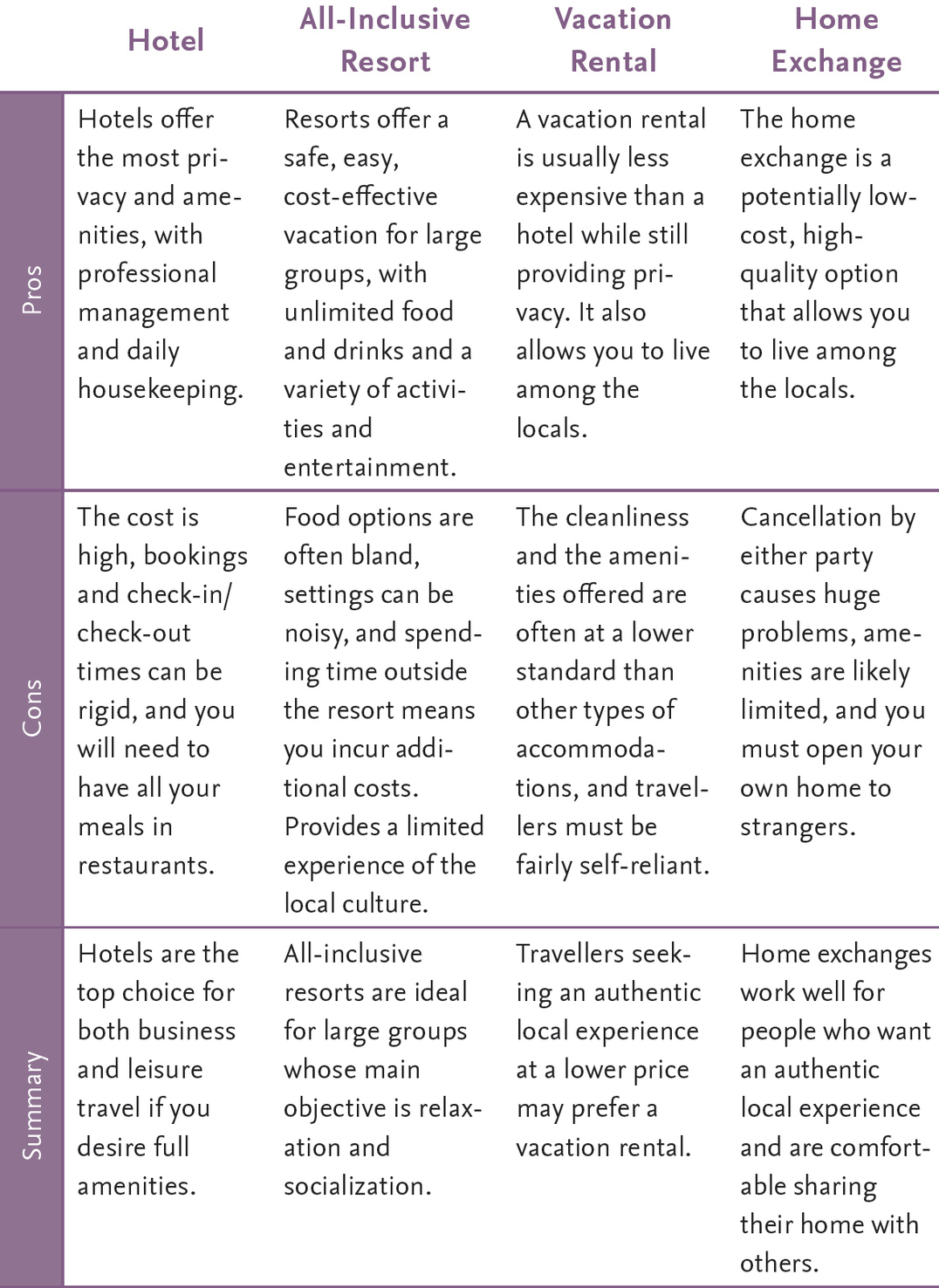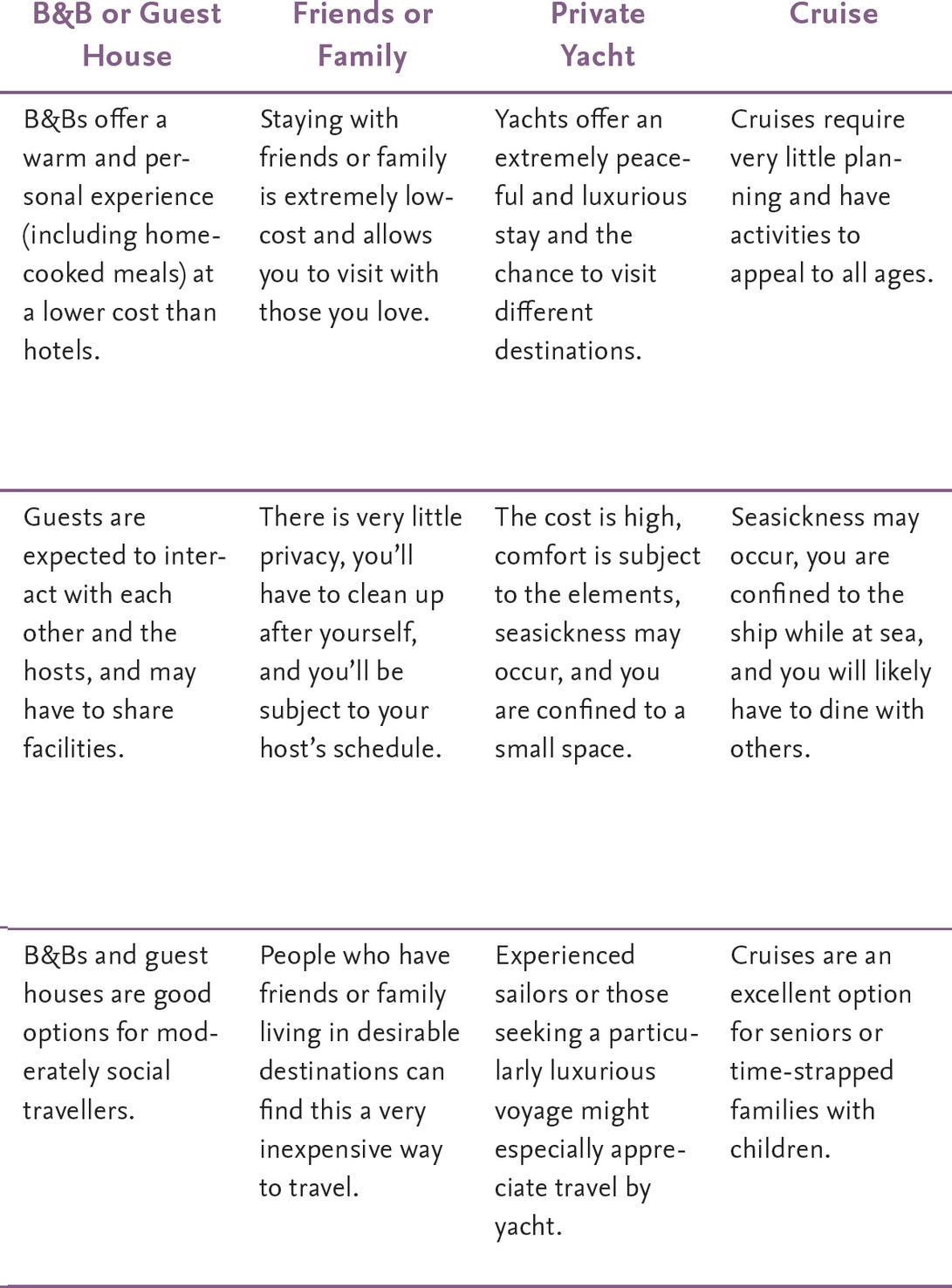Where to Stay

NO ONE TYPE OF ACCOMMODATION is better than another; which type you should choose really comes down to your personal preference, objectives and budget. Generally speaking, I prefer to stay in a hotel whenever possible—although of course a yacht is a wonderful option for a holiday as well! For pure relaxation in a social setting, you may consider a cruise or all-inclusive resort. If you enjoy a more authentic local experience, vacation rentals (booked through websites such as Airbnb or VRBO) or home exchanges can be a good option.




Here are some useful tips for tackling common challenges and questions that come up when booking accommodations.
HOTEL
My friend wants to share a hotel room to save money, but I don’t want to do this. How do I tell her? Hotel accommodations are generally expensive, and many people propose sharing a room to save money. However, if you absolutely don’t want to do this, then don’t skirt around the issue. You can say something like, “You know I am a creature of habit, and I hope you don’t mind, but I’d be much happier staying in my own room.”
How do I get the best from my hotel budget? If I have a choice between the cheapest room in a five-star hotel or the Presidential Suite in a two-star hotel, I’ll always pick the former. Even if the room is smaller, you will still experience the premium service and amenities that are offered only by a five-star hotel. This is a great compromise for me!
ALL-INCLUSIVE RESORTS
Are there different kinds of all-inclusive resorts, or are they all the same? There are many different kinds of all-inclusive resorts. Some cater to adults only, some couples only, some families and some singles. Do your research, read reviews and call the resort if you still have questions.
Am I stuck at an all-inclusive or can I leave the resort? All-inclusive resorts generally prefer you to stay on the premises to enjoy their activities, or purchase their tours and other special amenities. Having said that, renting a car and doing your own thing is absolutely an option. Just remember that while you are on the road you may be incurring expenses for snacks and meals that you have already technically paid for at your resort. In fact, if you plan to venture out and be on the road exploring every day, the all-inclusive resort may not be an ideal choice for you.
VACATION RENTALS
The website listing offers a lot of information, but how can I be sure that the vacation rental I choose will be right for me? When I have chosen this option in the past, I have always taken the time to contact the potential host in advance of booking, either by email or by telephone. This allows me to ask specific questions and find out if the accommodation and the neighbourhood offer everything I need.
Can I pay by cash to save money? Vacation rental companies protect you with a variety of rules and regulations, but they only apply if you pay through their site. Paying cash or otherwise attempting to circumvent the rental company is a bad idea and can put you at risk.
What if I’m not happy? Who do I speak to? Always communicate the issue to your host first. The host may be able to solve it for you quickly. If the host is unable to resolve the issue, contact the website you booked through directly.
HOME EXCHANGES
How do I know if I am making a good exchange? This is hard because the short answer is you don’t. Using an online agency with personal reviews helps. Speak to the potential host on the phone ahead of time to get a sense of what you might expect.
What if I damage something or, worse, what if the other party damages something in my home? Prior to the exchange you need to discuss and establish a policy for breakage and damage. Generally speaking, the person who did the damage should be held responsible for replacement or repair. That said, I think it is very important that anything of value (including, especially, sentimental value) needs to be put away. Additionally, make sure you have proper coverage through your home insurance.
How do I deal with personal items in my home? People will snoop in your home. You need to accept this from the start and prepare accordingly. Lock away or remove anything you want to keep private, and be sure to protect yourself from identity theft by removing sensitive information like bank and credit card statements, utility bills and documents related to investments, and putting a hold on incoming mail.
B&B/GUEST HOUSE
Is it rude to take breakfast to my room? This depends on the establishment, but it is generally frowned upon. You are usually expected to eat at the table because interacting with the host and other guests is part of the experience of staying at a B&B.
Can I go to bed when I want? Yes, but you must be respectful of others. If you’re a night owl, check before booking that the establishment does not impose a curfew, and, when you go to bed, be mindful of others who may already be asleep.
FRIENDS AND FAMILY
Do I have to eat what is being served? Well, let’s say you absolutely must try! Your host has gone to the trouble of preparing home-cooked meals for you, so do try to be gracious. Be sure to communicate any dietary preferences before you arrive.
How do I deal with my host family members and paying for expenses? Money can be a touchy subject, and I think it is best to raise this issue prior to your stay to avoid misunderstandings and hurt feelings. Always offer right away to pay for all your expenses. If your host is reluctant to take money from you, you may wish to offer to cook a meal or take your host out to dinner as a thank-you.
I’ll be staying at the home of friends while they’re out of town. Do you have any tips on being a good guest for my absentee hosts? Don’t be shy about asking for special instructions before you arrive. Do not help yourself to the liquor cabinet (or anything else, for that matter), or if you do, be sure to replace (exactly) what you use. Be considerate and keep the place tidy; strip the bed and launder the bedding before you leave. At the end of your stay, leave a thank-you note and a small gift.
PRIVATE YACHTS
Who should I speak to if there is a problem on board? The captain is the ultimate authority on board, not the chief steward. If there is a problem, speak to the captain.
What are the expectations for tipping on a yacht? The crew works very hard to please, so the tip should reflect their performance. The rate is generally 15 to 20 per cent of the charter fee. It is customary and preferable to give the captain the gratuity in cash in an envelope at the end of your voyage, and he or she will distribute it to the crew.
CRUISE SHIPS
Is it a good idea to take kids on a cruise? That depends. Just like resorts, different cruise ships cater to different customers—parents with kids, adults only, seniors. So, when you do your research, keep this in mind.
What do you do all day on a cruise? Well, it depends on the cruise line you’ve selected, so this is something to research. Provided you picked the one that best suits your interests, there will be plenty of appropriate activities to entertain you, and the cruise director will always be happy to help you find something to do.

